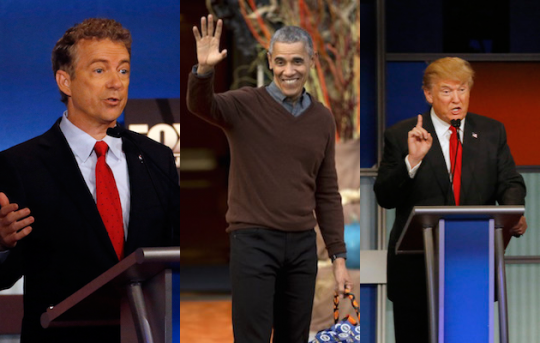In the course of a heated exchange with Marco Rubio over foreign policy tonight in Milwaukee, Rand Paul attacked the junior senator from Florida for proposing both family tax credits and an increase in military spending. "We have to decide what is conservative and what isn't conservative," Paul said, adding later, "This is the most important thing we're going to talk about tonight."
Maybe, but to look at Paul's numbers—which leave him in the company of John Kasich, holding on to a perimeter podium by his fingernails—attacking a strong military as part of a minimalist platform on government spending doesn't appear to be a popular argument with conservatives. Paul's situation is aggravated by the fact that only a year ago he was the darling of a press-driven "libertarian moment." Despite the generous amount of time that the moderators gave him to air his views tonight, his performance in the race thus far indicates that the moment is over—if it ever actually existed.
Don't tell Donald Trump! Trump gave his clearest exposition yet of a vision of American power, one that's very similar to Rand Paul's. He asked, of Russia and of the Islamic State, "Why are we always doing the work?" He said that American interventions are a mess and then, playing the wild card, proposed that we should have kept the oil (from Iraq? Libya? It wasn't clear, but he was rolling ...) and given it to wounded warriors. Points for originality, at least.
The politician who most agrees with Trump and Paul on foreign policy is Barack Obama. (Though in the president's defense, his position on oil redistribution to veterans is, as yet, unclear.) The president supports a smaller defense budget, a hands-off approach to the Islamic State and Eastern Europe, and a rejection of an American role not only as the world's policeman, but as its preeminent leader.
Rubio, Cruz, Bush, and Fiorina all gave reasonable, more or less detailed expositions of a foreign policy vision that seems like it will be more in tune with Republican primary voters in a world deeply affected by Obama's leeriness of American power. Trump's poll numbers thus far have been driven by a number of factors, most importantly his successful self-portrayal as an outsider to the establishment—amusing enough, for a New York City billionaire. Let's see what happens when they realize that his foreign policy is to the left of Hillary Clinton's.
